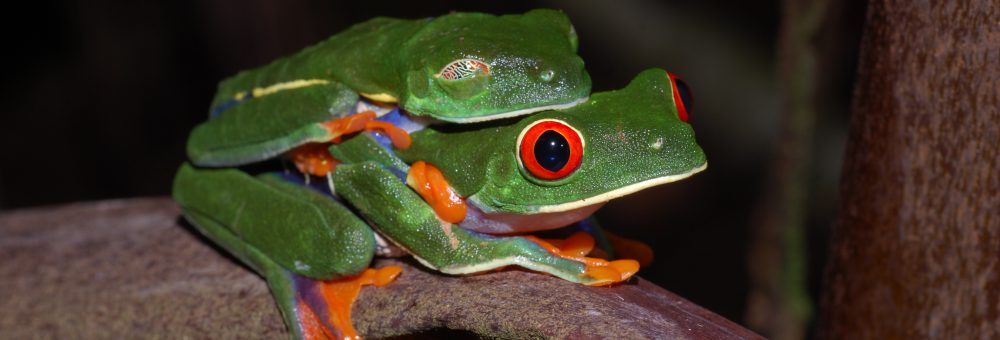Click on an image below to read about the exciting research that has been conducted by students in the Touchon Lab!
Megan Saari ’21 followed 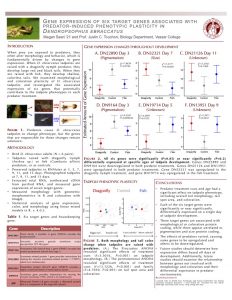 up on Jared Freedman’s thesis from 2018 (see below) to explore how gene expression varies during tadpole development. Megan used qPCR to amplify six genes that we have identified as being differentially expressed in tadpoles raised with fish or dragonfly predators. Megan showed that different genes appear to be turned on or off at different points in time. Megan is currently working as a research assistant at Children’s Hospital of Philadelphia and will be applying to medical school.
up on Jared Freedman’s thesis from 2018 (see below) to explore how gene expression varies during tadpole development. Megan used qPCR to amplify six genes that we have identified as being differentially expressed in tadpoles raised with fish or dragonfly predators. Megan showed that different genes appear to be turned on or off at different points in time. Megan is currently working as a research assistant at Children’s Hospital of Philadelphia and will be applying to medical school.
Asher Albrecht ’21 and Claire Stutzman ’21 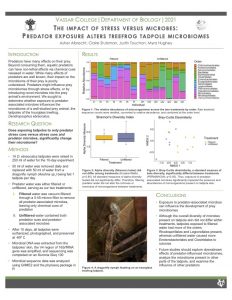 worked on a collaborative senior thesis project co-advised by Prof. Myra Hughey. Asher and Claire examined how the microbiome of D. ebraccatus tadpoles is altered by both the stress of being exposed to chemical cues of predation as well as the influx of microbes that come from being in an environment with a predator (who is eating and digesting other prey animals). Asher and Claire found that exposure to water containing predators increases in the presence of potentially harmful bacteria.
worked on a collaborative senior thesis project co-advised by Prof. Myra Hughey. Asher and Claire examined how the microbiome of D. ebraccatus tadpoles is altered by both the stress of being exposed to chemical cues of predation as well as the influx of microbes that come from being in an environment with a predator (who is eating and digesting other prey animals). Asher and Claire found that exposure to water containing predators increases in the presence of potentially harmful bacteria.
Sonia Gollerkeri ’21 conducted 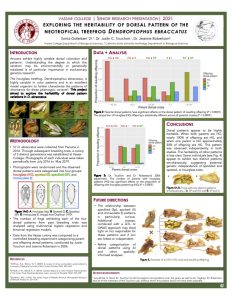 a senior thesis measuring the heritability of dorsal patterns in D. ebraccatus frogs. Adult frogs have one of four different basic dorsal patterns and Sonia determined that these are likely encoded by separate alleles and that at least the hourglass pattern has a simple form of Mendelian dominance. Sonia is currently an MPH Student at Columbia Mailman School of Public Health.
a senior thesis measuring the heritability of dorsal patterns in D. ebraccatus frogs. Adult frogs have one of four different basic dorsal patterns and Sonia determined that these are likely encoded by separate alleles and that at least the hourglass pattern has a simple form of Mendelian dominance. Sonia is currently an MPH Student at Columbia Mailman School of Public Health.
Ben Gregory ’20 conducted his senior thesis with me studying how anthropogenic noise affects male-male and male-female interactions in D. ebraccatus. Dean Rosenthal ’20 used his thesis to explore how D. ebraccatus tadpoles develop in response to combinations of conflicting predator cues. Both did incredible work but did not produce posters due to the start of the global pandemic. Ben has spent the last two years working as a research assistant at the University of Maryland and is applying for PhD programs. Dean is currently a research assistant at Brigham and Women’s Hospital.
Megan Coughlan ’19 worked with 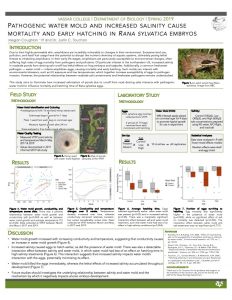 me for several years and used her senior thesis to study the prevalence of road salt runoff into ponds on the Vassar Farm and Ecological Preserve. Along with Tessa Waters ’20, Megan found that ponds closer to roads had more saline water, and that in turn increased the growth of the pathogenic water mold Saprolegnia, which infects frog eggs during the spring. Click on the poster to read more about Megan’s experiment. Megan and Tessa’s data were published in FEMS Microbiology Ecology! Megan is currently applying to medical school and Tessa is a research assistant at Sloan Kettering Cancer Center.
me for several years and used her senior thesis to study the prevalence of road salt runoff into ponds on the Vassar Farm and Ecological Preserve. Along with Tessa Waters ’20, Megan found that ponds closer to roads had more saline water, and that in turn increased the growth of the pathogenic water mold Saprolegnia, which infects frog eggs during the spring. Click on the poster to read more about Megan’s experiment. Megan and Tessa’s data were published in FEMS Microbiology Ecology! Megan is currently applying to medical school and Tessa is a research assistant at Sloan Kettering Cancer Center.
Nick Zuczek ’19 followed 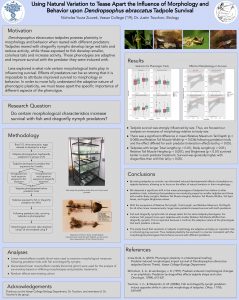 up on Annie’s thesis project (see below) for his own senior thesis. Nick was able to demonstrate that tadpoles raised without predators but that vary in their morphology are similarly vulnerable to predators (or defended from them) as tadpoles that have a predator-induced phenotype. This work was combined with Annie’s for our 2019 paper in the Proceedings of the Royal Society! Nick has been working at the NIH for several years and will be starting his PhD in fall 2022.
up on Annie’s thesis project (see below) for his own senior thesis. Nick was able to demonstrate that tadpoles raised without predators but that vary in their morphology are similarly vulnerable to predators (or defended from them) as tadpoles that have a predator-induced phenotype. This work was combined with Annie’s for our 2019 paper in the Proceedings of the Royal Society! Nick has been working at the NIH for several years and will be starting his PhD in fall 2022.
Jared Freedman ’18 conducted his senior thesis studying 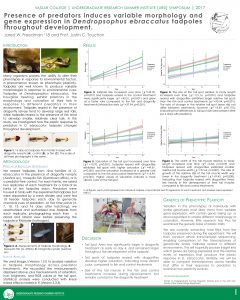 the genetic basis of tadpole plasticity. The project started during summer 2017 when Jared raised 9 families of D. ebraccatus tadpoles under different predator environments and then preserved them in RNAlater at various time points during development. In the fall semester, Jared extracted total RNA from 108 tadpoles and their transcriptomes are currently being sequenced. Click on the poster to read more about Jared’s experiment as part of URSI during 2017. You can also read about Jared’s project here. Jared is currently working on his PhD at Oregon State University in the lab of David Lytle.
the genetic basis of tadpole plasticity. The project started during summer 2017 when Jared raised 9 families of D. ebraccatus tadpoles under different predator environments and then preserved them in RNAlater at various time points during development. In the fall semester, Jared extracted total RNA from 108 tadpoles and their transcriptomes are currently being sequenced. Click on the poster to read more about Jared’s experiment as part of URSI during 2017. You can also read about Jared’s project here. Jared is currently working on his PhD at Oregon State University in the lab of David Lytle.
Annie Innes-Gold ’18 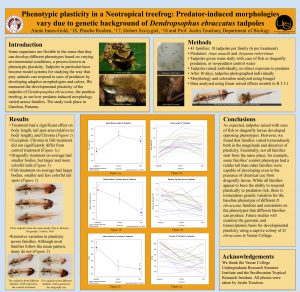 studied the adaptive nature of predator-induced tadpole plasticity. Annie was one of the students who came to Panama in 2016 and her poster focuses on describing variation in tadpole responses to predators. Annie’s thesis was part of a paper we published in the Proceedings of the Royal Society! Annie is currently conducting her PhD in Marine Biology at the University of Hawaii.
studied the adaptive nature of predator-induced tadpole plasticity. Annie was one of the students who came to Panama in 2016 and her poster focuses on describing variation in tadpole responses to predators. Annie’s thesis was part of a paper we published in the Proceedings of the Royal Society! Annie is currently conducting her PhD in Marine Biology at the University of Hawaii.
Phoebe Reuben ’17 began her senior thesis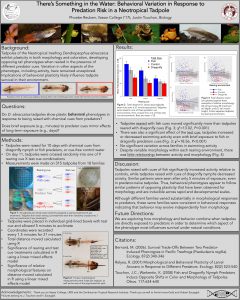 research in Panama in 2016, where she tested several hundred tadpoles that had been raised with different predator cues for variation in behavior. In a very clever experiment, she tested for “developmental” changes in behavior as well as “activation” changes. Phoebe’s thesis work was published in the Proceedings of the Royal Society! Phoebe is now working on her PhD at Tulane University in the lab of Hannah Frank.
research in Panama in 2016, where she tested several hundred tadpoles that had been raised with different predator cues for variation in behavior. In a very clever experiment, she tested for “developmental” changes in behavior as well as “activation” changes. Phoebe’s thesis work was published in the Proceedings of the Royal Society! Phoebe is now working on her PhD at Tulane University in the lab of Hannah Frank.
Hubert Szczygiel ’18 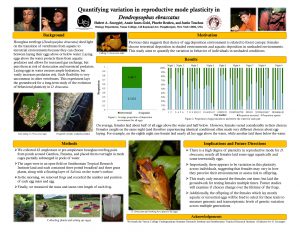 studied male-male competitive interactions. Hubert was one of three students who came to Panama with me in 2016 as part of my URSI team. Hubert’s poster for the 2016 URSI symposium focused on describing variation in the reproductive choices we documented in Panama. Click on the poster to read more!
studied male-male competitive interactions. Hubert was one of three students who came to Panama with me in 2016 as part of my URSI team. Hubert’s poster for the 2016 URSI symposium focused on describing variation in the reproductive choices we documented in Panama. Click on the poster to read more!
Tarif Rose ’21 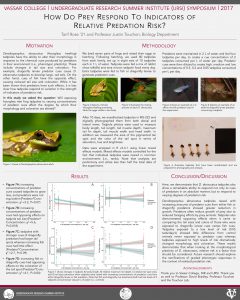 conducted research with me as part of Diving Into Research, prior to his first-year at Vassar. His project looked at how D. ebraccatus tadpoles respond to gradations in relative risk (i.e., variation in the concentration of predator cues). Do tadpoles respond stronger to more risk? Yes they do! Click on the poster to read more. Tarif went on to major in Computer Science.
conducted research with me as part of Diving Into Research, prior to his first-year at Vassar. His project looked at how D. ebraccatus tadpoles respond to gradations in relative risk (i.e., variation in the concentration of predator cues). Do tadpoles respond stronger to more risk? Yes they do! Click on the poster to read more. Tarif went on to major in Computer Science.
Kiki Walker ’19 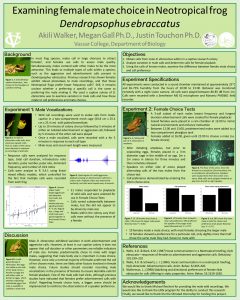 was an URSI student during summer 2017 and we worked to explore how females make choices about males. Lots of research has shown how females use calls to assess male quality. But do those choices really translate into who they choose to mate with? Using my frog colony, Kiki played calls to females from two different males and separately gave them the option of choosing those males to mate with. Click on the poster to read more about this great project. You can also read about Kiki’s project here
was an URSI student during summer 2017 and we worked to explore how females make choices about males. Lots of research has shown how females use calls to assess male quality. But do those choices really translate into who they choose to mate with? Using my frog colony, Kiki played calls to females from two different males and separately gave them the option of choosing those males to mate with. Click on the poster to read more about this great project. You can also read about Kiki’s project here
Luana Deng ’17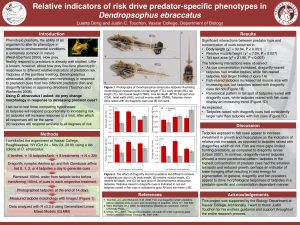 conducted a senior thesis asking how D. ebraccatus tadpoles respond to gradations in relative risk. Click on the poster to see her great poster! Luana is finishing up her degree in veterinary medicine at Oregon State University.
conducted a senior thesis asking how D. ebraccatus tadpoles respond to gradations in relative risk. Click on the poster to see her great poster! Luana is finishing up her degree in veterinary medicine at Oregon State University.
Lindsay Charlop ’16 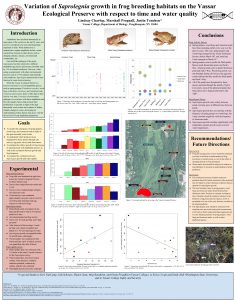 studied variation in the prevalence and abundance of water mold (Saprolegnia) in various bodies of water around the Vassar Farm and Ecological Preserve. We are currently following up on this work. Click on the poster to read more!
studied variation in the prevalence and abundance of water mold (Saprolegnia) in various bodies of water around the Vassar Farm and Ecological Preserve. We are currently following up on this work. Click on the poster to read more!
